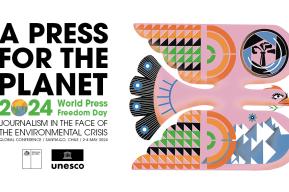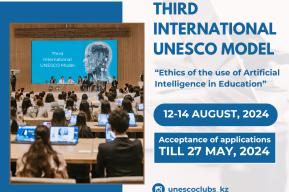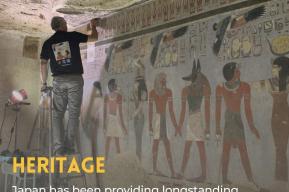Article
Lessons from multistakeholder driven digital policy development in Brazil, Germany and Senegal

In a knowledge exchange session on multistakeholder approaches to policymaking, including on UNESCO’s Internet Universality ROAM-X assessments, participants from Brazil, Germany and Senegal shared their experiences on strengthening inclusion and participation in digital policy development.
Matthias C. Kettemann, Research Program Manager and Senior Researcher at the Leibniz Institute for Media Research | Hans Bredow Institute in Germany, emphasized the need for a whole of society approach to policy making.
With the aim to adequately represent the realities of different stakeholder groups, it is important to make sure participants do not only belong to the wanted stakeholder group but are on the same level to ensure a vivid exchange.
Mr Kettemann underlined that for the German Internet Universality assessment, it was important for all actors involved to understand the purpose and process for consultations from the inception. He noted that repeated engagement among the multistakeholder groups was an important part of the process as it helped to build mutual trust.
Eva Sow Ebion, Director and Co-founder of Innovation for Policy Foundation, based in Senegal, emphasized the importance of preparation meetings and capacity building with specific stakeholder groups, especially if they are less familiar with topics like artificial intelligence, gender equality and digital transformation than other stakeholders. Such preparation meetings empower stakeholder groups to truly engage in discussions. Similarly, Laura Tresca, Councelor at CGI.br and coordinator of the Working Group on Gender in Brazil shared that in Brazil, special efforts were made to encourage participant ownership over the process with the help of extensive onboarding to the project and process.
We can only truly ensure multistakeholder engagement, if we look beyond the regular stakeholder groups in the urban areas. We need to decentralize our approach to involve multiple stakeholders, who will be able to bring representatives and views from people of rural areas and the informal sector at subnational policy level.
One concern that Michel Kenmoe, UNESCO’s Advisor for Communication and Information in Senegal raised was the lack of sex disaggregated data. Many countries in the region do not systematically nor regularly collate sex disaggregated data, particularly with regard to the Internet. This lack of data hampers the ability to conduct in-depth analysis necessary to formulate relevant propositions on how to address gender inequalities in policy development. In his experience, having multiple stakeholders raise these concerns with statistical institutes and policy makers, contributed to a positive response and engagement to improve the collation and availability of sex disaggregated data in the future.
Mr Kenmoe further elaborated on the need to establish monitoring and evaluation practices for multistakeholder approaches on inclusive policy making, and a power balance during deliberation.
UNESCO will launch its guide on multistakeholder approaches for AI policy making in 2022. The session discussion will inform the WSIS 2022 outcomes and subsequent global discussions on gender equality, access to information and digital transformation.




